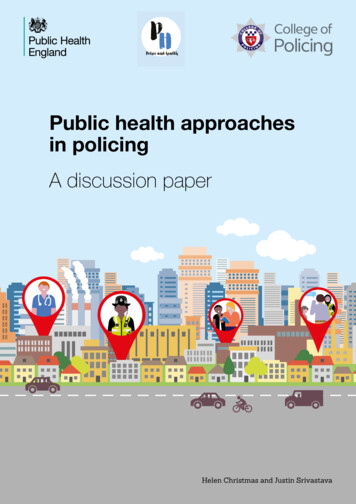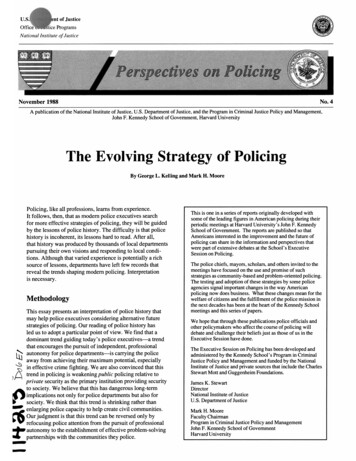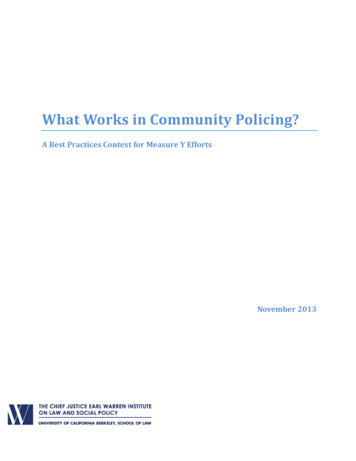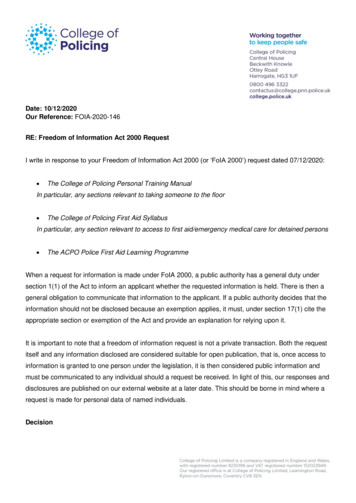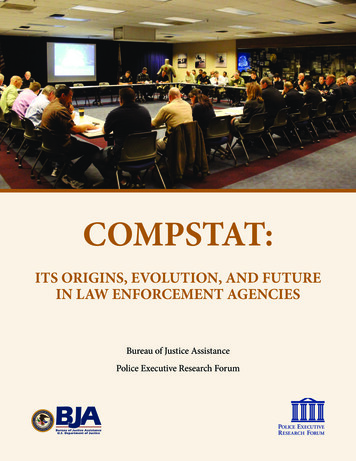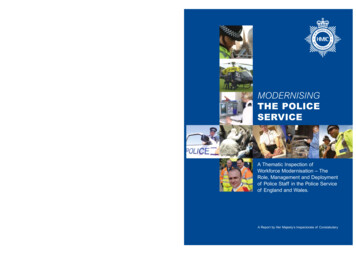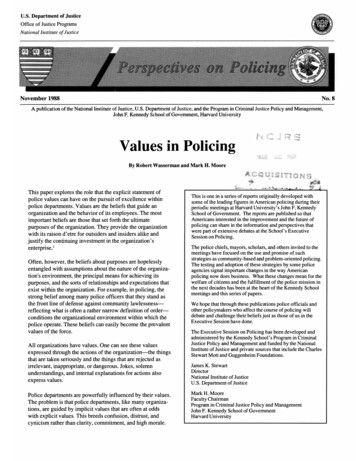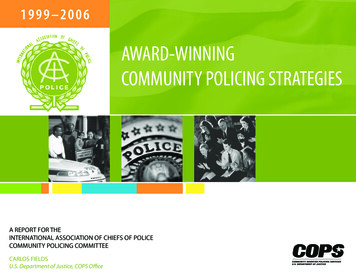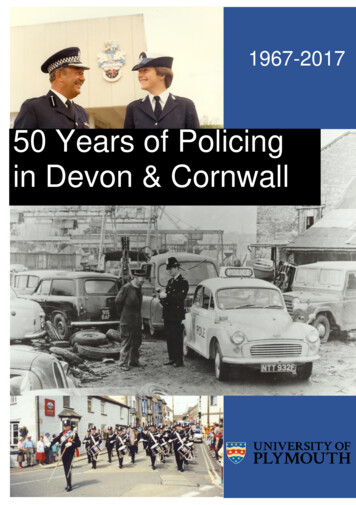
Transcription
1967-201750 Years of Policingin Devon & Cornwall
50 Years of Policing in Devon and CornwallOn 1 June 1967, the end of an era was marked for the independentpolice forces of Cornwall, Devon and Plymouth when they weremerged by Government mandate to form the ‘Devon and CornwallConstabulary.’ The historic union of the region’s constabulariesheralded a colourful mixture of cynicism, hope and good-humourfrom the rank-and-file. Differences had to be set aside as countyand city boundaries no longer existed, new working practices anduniform accoutrements began to appear, and local identity startedto erode.The 50th anniversary of the formation of the Devon and CornwallConstabulary was marked on 1 June 2017. In the months leadingup to the occasion, a concerted and comprehensive effort wasmade to identify and interview retired and serving officers from thepre-amalgamation era to the present day to capture their thoughts,feelings and memories of the past half-century.This booklet features excerpts from those interviewed by staff andstudents from the University of Plymouth’s School of Law,Criminology and Government. It provides a frank and fascinatingsnapshot of policing in Devon and Cornwall including anunprecedented glimpse of the career of Plymouth’s firstpolicewoman. Our thanks go to the police officers of Devon andCornwall, both serving and retired, for giving their time,photographs and thoughts for this project; to Devon and CornwallPolice, especially Sue Chivell, Admin Services Manager, fortranscribing the full interviews and to our students and colleaguesfor conducting them. Front cover: top image courtesy of R. and S.Middleton; middle and bottom images courtesy of S. Dell.Mark Rothwell, Author and Police HistorianProfessor Kim Stevenson, Project Co-ordinator1
Eileen NormingtonServiceHistoryA pioneer in policing in the South West, Eileen Normington (née Milo)was the first member of the Women’s Auxiliary Police Corps in Plymouthand later one of the city’s first sworn women constables. Eileen joinedthe W.A.P.C. on 3 September 1939, on the first day of the Second WorldWar. Twenty-four hours later, she was in uniform interviewingprospective members of the new auxiliary force. Eileen was retainedpost-war and sworn as a constable, serving in traffic and CID in her latercareer. She retired in 1960 and celebrated her 100th birthday on 30 June2017.“THEY PUT IT OUT ON THE WIRELESS THAT THEY WANTEDWOMEN TO GO UP TO THE POLICE STATION TO WORK WEWENT UP, MY FRIEND AND I AND GAME FOR ANYTHING ILEFT MY NAME AND ADDRESS.”Answering the Call for Women Volunteers, 1939Living and working at the Police Station“I was put into a new office which was calledthe War Department they put an Inspectorof police in, and me to do any office work.We used to sleep in, you see someone wasalways living there. We had the firewomenfrom the fire brigade. You had men andwomen separately and fire brigade womenslept in and some policewomen slept in. Theywere always on call.”2W.A.P.C. Eileen Milo in1939. (Eileen NormingtonCollection)
Eileen in 2015 at an event celebrating 100 years of women in policing. (EileenNormington Collection)“It’s hard to think that I was born at the same time as the first policewomenappeared on our streets during the years of the Great War. In my own servicefrom 1939 until 1960 in the Plymouth City Police I became one of the first twosworn female officers in the city force. I saw many changes in the decades inwhich I served myself. Whatever would it be like if one of those first policewomenin 1915 came ahead 100 years and saw the work which women in the PoliceService do now? So much has altered for the better for us ladies in the Forcenowadays. Pay, hours, conditions and the ability to marry without having to giveup your job to name but a few significant changes. But I wasn’t alone during thosechallenging times when Plymouth was being bombed night after night and we girlsheld the fort at Police Headquarters Control Room, even when an unexplodedbomb was dropped through our ceiling!”Eileen speaking in 2016. Excerpt from Simon Dell’s ‘The Fair Arm of the Law.’3
Leonard Oatey and Phil BuntServiceHistoryLeonard Oatey joined Cornwall County Constabulary in 1950 and serveduntil 1966. His service included a tour in the Isles of Scilly, as well aspostings in Truro, Bodmin, Helston and Liskeard. Leonard transferred toWiltshire Constabulary in 1966 and retired in the rank of Superintendentin 1980. His son-in-law Phil Bunt joined Avon andSomerset Constabulary in 1975 and transferred to Devon andCornwall Constabulary three years later, serving the remainder ofhis career there until 2005.“When I joined the RAF at 18 I had no intention then of becoming apoliceman. It was only when I did my National Service that that I suddenlyrealised I didn’t want to return to clerical work at the China Clay Companyin St Austell. I joined Cornwall Constabulary on 4 April 1950 and because Iwas a bright young constable, I did a year on the Scillies! It was lovely.”Leonard Oatey on joining the Cornish police force“I’m very much from a police family. Myfather served in the CornwallConstabulary and was the first manappointed as a police driver when thetraffic department was formed in 1938.My uncle served with him and his sonjoined as well so at one point there werefour of us called Oatey in the Force,which was certainly unique. My twodaughters both became policewomen inCornwall as well.”A Police Family4Thoughts on Amalgamation“Being in Wiltshire I wasn’taround for the amalgamationwith Devon but I know myCornish colleagues were veryapprehensive about it, smallas the force was. But itworked very well. A lot ofsergeants in that forcebecame Inspectors after themerger.”
“I’d always expressed an interest in being a police officer fromwhen I was young and my parents never stood in the way ofthat. My dad left the door open to me joining the family firm,but I never did. I was conscious of the police growing up, mainlyfrom what I saw on the television; Dixon of Dock Green and ZCars and that sort of thing. When I was about 12 my father tookme around Newquay Police Station where I met SergeantTommy Fox. My father told him ‘the boy is interested’ and myview of the police became even more positive after that.”Phil Bunt’s early aspirations and impressions of the policePhil Bunt on working in Force performanceand the value of sergeants“In the 1990s, the Government became fixated withtargets and performance indicators. Forces were putunder pressure to crunch data and somehow improve theperformance of the Force based around this data. OurDeputy Chief Constable, David Philips, oversaw the‘quality of service unit’ and was an inspiration. He wastotally pragmatic and had no real time for the numbercrunching but believed that if we were to have such a unitit would also have to improve the quality of service to thepublic. He was really fixated on the idea that managersweren’t managing; sergeants weren’t doing their jobs.Sergeants were the people who could make a differenceand I remember the HMI talking to us years before andtelling us that the sergeant was the most important rankin the force. Really good sergeants could make all thedifference to what happened on the ground both in termsof the results that the officers got but also the quality ofservice that members of the public got.”5
Sydney RowsellServiceHistorySydney ‘Syd’ Rowsell joined Exeter City Police in 1952 and served in the Cityof Exeter where he reached the rank of Sergeant. In 1969, following the policeamalgamations of 1966 and 1967, he was posted to Middlemoor Headquartersand worked in the Devon and Cornwall Constabulary public relations andcrime prevention departments. Syd was also involved in the formation of theForce Museum. He retired in 1973.Joining the Force“My wife was mad keen to start a family and our first son was due inFebruary and I was working on the council at the time sort of a deadend job. With fatherhood so close coming up I thought well, I’d bettershake myself. A friend of mine was in Exeter Police and he arranged aninterview for me. I took the interview with the chief constable and chiefclerk and they accepted me.”Meeting the Beatles in 1963“I rated myself as a good driver, a safedriver, and then in contrast to that I mustadmit that I overstepped the mark onenight speeding and I damaged thepolice car. It was memorable in so far itwas bonfire night, November 5th and Ibent the patrol car quite badly aSuperintendent received a report from thetraffic Inspector and he said, ‘I recommendPC Rowsell be returned to foot patrol atonce.’ And the Chief Constable endorsed it‘yes.’ So I went back on the beat for sixmonths and the week after I went back onthe beat, the Beatles came to Exeter andI was at the ABC in Exeter and I met theBeatles in their dressing room there. Sobeing slung out on the beat enabled me tomeet the Beatles!”6Dealing with abusive‘customers’“You’ve got to beprepared to be insulted.Many of them doubt yourparentage and tell you inno uncertain terms whatthey think of you. Therewere certain breeds they’ve grown up withcriminal families andthat’s their way of life and they’re anti-police,anti-authority, antieverything. So that’s oneof the things that youhave to do you have todevelop a very thick skin
Police Sergeant Sydney Rowsell, late 1960s. (Syd Rowsell Collection)“For my first 9 years I worked the beat and you were, unless someincident was developing, on your own all the time. A lone figure,which in the main was respected by most people. Most of thepopulation were supportive and they respected a police officer inuniform and they would co-operate if you needed help or neededinformation. They would help, and you sort of cultivated thatrapport between yourself and the public. People would come upand talk to you you wouldn’t stand about talking to the sameperson for hours on end but you had that direct contact with thepublic which of course, when everyone went mobile, was lost.”Relationship between Police and the Public7
John Goodman RoweServiceHistoryCornishman John joined the Metropolitan Police in 1953 as a cadet andserved for one year before being called up for National Service. In 1956,after two years in the Air Force, John returned to Cornwall and joinedthe local constabulary and served through amalgamation until 1988.“After two years’ National Service in the Air Force I came back toCornwall and joined the Cornwall Constabulary. At the time I wascourting a young lady in Penzance and we were all set to getmarried, but just after I’d got out of the services and joined theforce I received the proverbial ‘Dear John’ letter. The odd thing isI came back to Cornwall because of this young lady, who’d goneoff with someone and moved to London! But such is.Subsequently I met my wife and we’ve been married for 58years!”To Cornwall by FateThe Public Perception of the Police“The perception of the police by the public haschanged. In our time, the police really could dono wrong and you were held in very highregard. Nowadays, people are more concernedabout their rights rather than theirresponsibilities and there is a disregard forauthority and included in that is the police.8
“I JOINED THE CORNWALL CONSTABULARY IN ’56 WHEN MAJORHARE WAS CHIEF CONSTABLE. THE OLD CORNWALL FORCE WASHELD, BY AND LARGE, IN GOOD RESPECT. I LIKE TO THINK I WASPART OF IT. I DON’T THINK THE RESPECT IS THERE NOW LIKE IT USEDTO BE. I REMEMBER GOING ON THE PARADES JUST BEFOREAMALGAMATION. WE HAD ONE PARADE IN BODMIN AND ONE INTRURO. IN THOSE DAYS, VIRTUALLY EVERYBODY HAD DONENATIONAL SERVICE AND KNEW HOW TO MARCH.”Pride in the old Cornish forceThe last parade of the Cornwall Constabulary. Conducted on arainy day in Truro, May 1967. (Mark Rothwell Collection)9
Keith SolomonServiceHistoryKeith ‘Solly’ Solomon joined Cornwall County Constabulary in 1961 aftera period of service in the Merchant Navy. After training andacclimatisation at Chantmarle in Dorset, Keith was posted to Falmouth.He later served the Cornish towns of Liskeard, Newquay, St ColumbMajor and St Austell before taking retirement in 1981. In 2007, at the ageof 70, Keith was appointed Police Chaplain and served the Cornishdistricts of North Cornwall and Restormel. He retired from the chaplaincyin 2012.“CORNWALL WAS A POOR COUNTY, SO WE HAD TO MAKE DOWITH WHAT WE COULD GET. WHEN I JOINED, I HAD CAST OFFUNIFORM TO WEAR. MY CAPE HAD FOUR STAMPS IN IT;UNIFORM WAS REPAIRED, RE-STAMPED AND REISSUED AGAIN,SO FOUR PREVIOUS OWNERS TO ME.”Making the best of what they had“The best part of my police education in thosedays was in the police canteen. You’d hear anofficer say he’d had this situation come up andyou’d have a discussion between four or fiveofficers. By the time you’d finished you’dsolved the problem and improved upon it.That was great, that was.”Problem solving at Chantmarle10
PC Keith Solomon in the 1960s. (Keith Solomon Collection)“To sum up my service, I’d say that I had to follow my owninstincts most of the way through and I was never one to beput upon. But by-and-large, I enjoyed my service and I amhappy that I was able to serve – even if it was sometimescontrary to Judge’s Rules, and I stopped many a lad fromspoiling his future life and career by not being too ‘correct’in my attitude. A series of Christmas cards over the yearsfrom the family of the man and his two sons who hadassaulted me, and who I caused to be gaoled, is myconfirmation that although I might not have been alwaysright. I did try to do my best.”Excerpt from ‘Telling the Tale – A Policeman’s Reminisces or I Did It My Way!’by Keith Solomon11
Jane CampbellServiceHistoryA practising solicitor by day, Jane joined the Special Constabulary inTiverton in 1964 and served for 19 years. Jane was one of the firstwomen in the region to join the specials after the rules around appointingwomen specials were relaxed nationally.Measuring up for Duty“I WAS SWORN IN AT TIVERTON IN 1964. IT WAS VERYENTERTAINING TO GO TO TIVERTON AS THE FIRST LOCALSPECIAL FEMALE. WHEN I WAS MEASURED UP FOR MYUNIFORM IT WAS DONE IN A BIG ROOM IN FRONT OF ALL THEREST. I WENT UP TO THE DESK TO BE MEASURED AND THETAILOR WENT BRIGHT RED AND SAID ‘I THINK WE’LL GO IN THESTORE ROOM!’”“At the time I was accepted into thespecials, I was going out with a jock in theFleet Air Arm and he thought it washilarious, and so did the rest of hissquadron. They didn’t take it as the honourit should have been. I was definitely treateddifferently because I was a woman. It wasdifferent to being a man in the specials. Iwas not trusted by the regular police to dotraffic control, but they were very nice tome. I have no complaints at all.”Being a woman in a man’s world12“What’s expected ofwomen is different towhat was expected ofme at the time. But Ihave no complaints atall, it was of its timereally. I was too busythinking of enjoyingmyself!”
Richard MedlandServiceHistoryRichard joined Plymouth City Police as a cadet in 1967 and servedthrough amalgamation until 1993.“As a young officer, I found I had a gift for reaching out to people quickly todiffuse a situation. I didn’t have to call the lads to help me every time there wasa difficult situation and I didn’t have to physically handle it myself. All I had to dowas get in touch with them very quickly and I had a gift for it. There was this onetime when I caught a drunk Irish labourer staggering to his car and I said to him‘You’re not serious are you?’ He replied, ‘You going to stop us?’ I said, ‘You dounderstand that if I don’t, I’ve got a duty to make sure others do? I advise you toget a taxi.’ He grumbled and walked away. The following Sunday morning Iencountered him sober in the street and he thanked me for what I did.I once attended a troublesome character with mental health issues at VospersGarage in Plymouth. Instead of doing the macho thing, I talked him down. Themanager turned to me and said, ‘You’ve got something. Don’t lose it.’”Discretion and diplomacy“I’m very proud that I can still walk throughthe streets in Barnstaple and a man in hisforties can come up to me and greet mewith apparent respect. I may have lockedhim up a long time ago or been his YouthClub Leader at some point. Either way, it’sa respect.”The rewards of community policing13“One of the mostimportant decisions Imade was to becomecommunity constable.There were officers wellsuited to breaking upviolent mobs, I wasn’t.So, I think I chose wiselyand worked throughrelationships rather thanby force.”
Reg DavisonServiceHistoryReg joined Cornwall Constabulary as apolice cadet in 1966 at the tender age of17. Following the amalgamation of1967, his tenure as a cadet wasextended by five months owing to rulesimposed by the Chief Constable of thenew force, he graduated to constablelevel in March 1968. Save for a spell inDevonport, Reg served his whole careerin Cornwall, spending 22 years in CIDand retiring in November 1997.Thereafter Reg rejoined in a civiliancapacity where he has remained eversince, racking up 52 years of continuousservice as of 2018.How the Cornwall force developed itsrecruits“In Cornwall they put you on lots ofattachments to different things to developyour personality. I did community servicevolunteers and was one of the two deputymanagers of Hornsea YMCA in CrouchEnd, North London, for three months. Ialso did Outward Bound in the north ofScotland, Morayshire. It was a 26-hourtrain journey from Cornwall. As a policecadet we also used to go hiking acrossBodmin Moor and in the summer spend amonth on Dartmoor where we lived undercanvas, literally. We arrived, and onemonth later, we left!”14Public Perceptionof the Police“When I joined, thepolice were thepremier publicservice and you hadto have higherqualifications tobecome a policeofficer, and thepublic respectedyou more than theother publicservices. In my view,that’s completelyturned on its head.You’ll always haveyour people thathate the police, butcertainly when Ijoined there wasstill that respect fora police officer. Thefire brigade haslobbied verysuccessfully overthe years and noweveryone sees thefire brigade as beingso much better thanthe police. We’velost a lot of respectfor one reason oranother, which is ashame.”
“TAPE RECORDING CHANGED YOURINTERVIEW STYLE. CONTEMP’ NOTES RUINEDINTERVIEWS BUT TAPE RECORDING, FOR ME,BROUGHT IT BACK. ANOTHERTECHNOLOGICAL THING FOR ME WASBRINGING CCTV INTO CUSTODY CENTRESBECAUSE WE WERE ALL SCARED STIFF ABOUTIT, BUT IT WAS A GOOD THING BECAUSE YOUBEHAVED PERFECTLY, YOUR PRISONERDIDN’T, AND THERE’S YOUR EVIDENCE.”How technology aided police processes“I was a detective in Falmouth at the time and was used to thelocal solicitor’s offices each prosecuting and defending. In effectyou’d turn up at court with your case and the lawyer would turnup. and under one arm he’d have a bundle of prosecution filesand under the other arm he’d have a bundle of defence files. So,on the same day, the lawyer would be both prosecuting anddefending. Being a small town, we all knew each other,everyone knew everyone and we all knew the magistrate’s clerkstaff. Everyone liaised, and it worked. As soon as the CPScame, it just went out of the window.”How the creation of the Crown Prosecution Service in 1986 affected policeWhat makes Reg proud“I think the fact I can go into Falmouth on a Saturday morning with my wife nowand people still remember me. I haven’t been stationed at Falmouth since 1988.People still remember me, villains, decent people they still come up to me andwant to talk to me. I must’ve done something right I suppose!15
Andrew PierceServiceHistoryAndrew joined Devon and Cornwall Constabulary in 1972 and servedin Plymouth, Tiverton and Bodmin, Barnstaple, Exeter and HQ. Heserved most of his career in CID and retired in 2004 in the rank ofDetective Superintendent.Early brushes with the law“My personal interaction with the police as I was growing up wasfairly consistent, there was no conflict. At one point I was walkingdown High Street in Barnstaple with a friend and we were being alittle bit noisy and this woman police sergeant appeared fromnowhere and told us off sick! I remember her later, when I was inthe job, she ended up a superintendent and was quite a formidablecharacter. There was an instance about the same age, when I wasabout 16, when I shot a boy with my air rifle. He’d been annoyingme all day and I saw an opportunity in the dusk to accidentallyshoot him in the rump, which I did! His parents and my parentsdiscussed the matter and dealt with it. The police were informed,but they were entirely happy that the matter was being dealt withappropriately. This would have been about 1968.”Inspiring words from a fellow officer“HE SAID: COPS SHOULD WIN OSCARS EVERY DAY, BECAUSE YOUPLAY A ROLE AND PEOPLE ACCEPT YOU PLAYING THAT ROLE BECAUSETHAT’S THE WAY YOU ACT IT – WITH PASSION AND BELIEF.”16
“When PACE was first mooted, we thought it was the end of policingas we knew it. But the training Devon and Cornwall did for PACE wasexcellent. There was an issue about interpretation and I arrested twoguys for burglary and they had not long been out from borstal. I said tothe custody sergeant ‘I’m objecting to bail on these two as they’llcommit further offences.’ The sergeant responded, ‘That’s not aground under PACE.’ And I said, ‘It is, because PACE says that a reasonfor objecting to bail was that if you grant bail it could cause loss toanother person.’ The sergeant said, ‘That’s far too wide aninterpretation, I’m not having that.’ So I said, ‘I’m appealing to theSuperintendent then!’In any event, what we should always do is interpret. We should alwaysinterpret the law reasonably to our advantage as investigators andprosecutors until a court tells us differently.”Getting to grips with the Police and Criminal Evidence Act 1984Interviewing in the pre-tape recording era“I am grateful that tape recording interviews was not the norm whenI was an operational DC and DS, because I quite often got the gigglesin interviews! I particularly worked with a colleague, DC Jim Foley,who was a brilliant detective with a marvellous sense of humour [andended up as DCI]. But he was also able to ‘deadpan’ no matter whatthe situation – I’m the reverse! I have a sense of humour, but I’m agiggler, and several times when Jim and I were DCs together I had toleave the interview room because the swine would make me laugh.”17
Marilyn WignallServiceHistoryMarilyn joined Devon and Cornwall Constabulary in 1975, in the latterperiod of policewomen’s departments, largely serving in Torbay andOkehampton. She retired in 2006, and thereafter returned to the Forcein a civilian capacity in the employ of March on Stress, the provider ofthe Force’s Trauma Risk Management mechanism (TRiM.)“MY POLICE TRAINING WAS INTERESTING. IT WAS ATTHAT TIME (1975) THAT I CAME TO UNDERSTAND THATFEMALES WEREN’T REALLY WELCOMED IN THE POLICE.THERE WAS A LOT OF SEXUAL HARASSMENT AND A LOTOF RESISTANCE TO THE ROLE OF A FEMALE OFFICER. “Being a woman in a man’s world, 1975“When I joined the police, I wanted tobe a police officer, not a police woman.The latter were only supposed to lookafter women, children and dogs, and Ididn’t want that. I wanted to be a policeofficer and go and do the same as themen did. Integration with the men tookplace on 1 March 1976, so I was only inthe Policewomen’s Department for ashort time. After the integration, I wasthe only operational woman constableleft, as all the others had been postedto back office functions and the newJuvenile Department, which could haveeasily just been the old Women’sDepartment renamed.”18
“The highlights of my career? Working in the male environment, Iknow it had a lot of disadvantages, but it also had a lot ofadvantages. I’ve never seen wearing a police uniform as a positionof power, you negotiate and converse with the public. I joined thepolice because I wanted to make a difference. Being able to dealwith people from all walks of life with different crises, I was proudof that. I was involved in crowd control during the Queen’s SilverJubilee when the Royal Yacht came in to Torquay, that was ahighlight! But just being involved in policing and all the differentissues that went with it at that time was probably the majorhighlight.”The highlights of a police career“Beginning my police career 8 years after amalgamation, I wasn’tinitially aware of any animosity between members of the oldconstituent forces. That didn’t happen until 1988 when I wasmoved to Okehampton. I was puzzled as to why a PC was wearinga crown on his tunic and, of course, I then realised he was wearingthe Cornish uniform.A few of them I heard talking about the good old days in Exeterand Plymouth City Police, but other than that there was noanimosity shown. It was a case of ‘Let’s just get on, muck in andcrack on with it.’”The echoes of amalgamation, two decades on19
Barry FrostServiceHistoryBarry joined Devon and Cornwall Police in 1978 and served inBarnstaple, Crownhill, Tavistock, Exeter and Torbay, with a stint atChantmarle in Dorset as an instructor. He retired in 2008 in the rank ofSuperintendent.The Eureka Moment“I remember being in Barnstaple in 1978 and thinking oh I hate this job (BHSsales rep) and I remember looking out of the hotel window having a cup of teaand seeing some coppers walking around. That was my Eureka moment.”“One of the harshest bits of my career came after three and a halfyears’ service when I was offered a position on the Plymouth TaskForce by the Chief Superintendent. I met the Inspector and he said,‘I’m telling you now, I don’t want you, you’ve jumped the list and Idon’t want you on here.’ That was my welcome from him. Then Imet the sergeant who said, ‘We’re looking to kick you off becauseyou’ve bucked the system.’ I thought well I haven’t bucked anysystem, I was offered. After the first week, nobody spoke to me. Theonly officer that did speak to me was a policewoman who wasgetting a hard time as well because they didn’t want women in thetask force. They were ‘anti-me,’ but not necessarily because theysuspected I was gay. It was pretty hurtful, and they made gay slursas a way of attacking me.”The darker side of 1980s police culture20
Policing the Miners’ Strike“We went up from Devon and Cornwall in prison vans, whichthe Federation wouldn’t allow nowadays! I remember theLabour Party were very anti-police because they thought wewere violent. But in fact, we got on very well with the picketswherever we went. David Owen was MP for Plymouth at thetime and I wrote to him saying how disheartening it was thatwe were doing this fantastic job, with long hours, and all wedo is get criticised saying we’re beating people up. Heactually wrote a nice letter back saying most members ofParliament support the police.”21
Paul RichardsServiceHistoryPaul joined Devon and Cornwall Constabulary in 1979 and served inCamborne, Cullompton, Exeter, Abbotskerswell, the Isles of Scilly andTorbay becoming a Sergeant. He retired in 2009.“I was overjoyed when I was accepted into the police. The sergeant shookmy hand and said, ‘You’ve got a job for life, welcome to the family.’ It felt likejoining a club for life, and for 30 years they were going to look after you. Thatfeeling was almost embracing, and I very much felt a part of something.”Being welcomed into the service“During the Miners’ Strike, we were known as ‘The Daffodils.’ We hadthese yellow jackets, and every other force was wearing black. Theywere reversible. Our Chief Inspector, a man called Joyner, said, ‘Whenwe arrive you will turn your jackets inside-out.’ We questioned this, andhe said, ‘It’s so I can see you, because it’s a sea of black out there andI need to see where you are.’ So, for the entire deployment in 1984, wewere in yellow.We were the one force that was encouraged to talk with the picketers,as long as we didn’t talk about Margaret Thatcher, Scargill or how muchwe earned. So that’s what we did, just talked like human beings do.Every other force, Cheshire and the Met in particular, were briefed notto speak to the miners. We felt sorry for the Cheshire lot as they justhad to stand there and passively not speak.”Policing the pickets, Devon and Cornwall style, in 198422
“PACE was an absolute pain when it began. For a while theFederation kept saying ‘Oh, it’s the Criminal’s Charter, we’re alldoomed, it’s going to take lots of resources.’ But actually, uspolice are a funny lot because although we have a moan aboutit, we’re very pragmatic and just got on with it. In the end, itbecame routine and once you learned how to use a taperecorder and booked your prisoner into custody, that was it. Ithought PACE was quite straightforward in the end, because itgave you easier justification for what you were doing.”Getting to grips with PACE“ONE OF THE THINGS I’M MOSTPROUD OF WAS BUILDING TEAMS,ESPECIALLY IN DEPARTMENTS WITHPREVIOUS BAD MANAGEMENT.ENABLING PEOPLE TO DO THEIRJOBS PROPERLY UNTIL THEY WERETHE BEST THEY COULD BE. DOINGTHAT WAS ONE OF THE PROUDEST IFELT IN TERMS OF MY POLICECAREER, WHERE I THOUGHT I’DMADE A DIFFERENCE TO PEOPLE’SLIVES.”Pride in teambuilding23
Kevin HarrisServiceHistoryKevin joined Devon and Cornwall Constabulary in 1982 and served inExeter, Okehampton, Bideford and Barnstaple on response, traffic andCID. He spent two-thirds of his tenure in CID and retired in the rank ofChief Superintendent in 2012.“I knew from the age of 12 I wanted to be a cop. A police officermarried my cousin and we always seemed to get on. From the timethat I first met him I thought ‘That’s what I want to do.’”“My most enjoyable experiencewas as Authorising Officer for theRegulation of InvestigatoryPowers Act, or ‘RIPA.’ The Actbasically drove a coach and horsesthrough the 1998 Human RightsAct and, if it was in the interests ofnational security and theprevention of crime, a criminal’shuman rights could be undoneand overridden by the State. It’sstopped
A pioneer in policing in the South West, Eileen Normington (née Milo) was the first member of the Women's Auxiliary Police Corps in Plymouth and later one of the city's first sworn women constables. Eileen joined the W.A.P.C. on 3 September 1939, on the first day of the Second World War.
